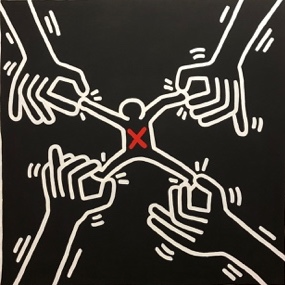Downloads
What Covid-19 make us reflecting about
I have just received another funny quote through social-media and you might have read it before: “I've been home with the family for a few days now. I must say, they're actually quite nice people…”
At first glance, home office sounds wonderful, what many people call the ideal work-life balance model! Being so close to partner, family and home while managing their daily tasks.
And it kind of sounds like it! You can sleep in longer, at least in theory: no long fussing in the bathroom, finally wearing comfortable clothes and no long and tiresome way to work… That saves you time and energy! Not to mention the ecological aspect! No annoying disturbances by colleagues or customers, who are at best virtually present. Simply relaxed working in very familiar environment!
 This very much satisfies our need for binding, which is one of the (five) basic psychological needs according to Prof. Klaus Grawe (German psychotherapist 1943-2005):
This very much satisfies our need for binding, which is one of the (five) basic psychological needs according to Prof. Klaus Grawe (German psychotherapist 1943-2005):
- We are social beings.
- We need and seek close contact with family, partner and friends. The really close caregivers with whom we share the beautiful but also the difficult moments in our lives.
- We experience and share hereby happiness, trust, comfort and support!
Under these circumstances, the relationship processes once again require our attention more than they already do: Normally we spend most of the week in an awake state at work, away from home and without the close contact to partner and family, but with colleagues, possibly customers and have direct or indirect contact with many other people. With all the related inputs!
In remote work that is different and the dynamics of the relationships to each other, require much more empathy and understanding: With too much intimacy, friction can quickly arise, because what is annoying about the partner now affects the other even more intensively and what we like about the other is no longer so well perceived due to our own stress. Therefore it may help to plan the coming days and weeks, to clarify when you want to spend time together and how you want to organize it. Also think about to reserve time for yourself! It is important to structure the days. Habits, routine and rituals create safety, trust and reliability.
 This satisfies our need for control and orientation, another of our basic psychological needs. We want to know what comes next, so we can plan and control things more easily. Especially at a time when many questions are being raised and values are being shifted and many people are worried about health, economic consequences and political uncertainty! With the COVID-19 mess we become aware that we are no longer in control of ourselves, our lives and the situation and that we will lose orientation for an (indefinite) period of time!
This satisfies our need for control and orientation, another of our basic psychological needs. We want to know what comes next, so we can plan and control things more easily. Especially at a time when many questions are being raised and values are being shifted and many people are worried about health, economic consequences and political uncertainty! With the COVID-19 mess we become aware that we are no longer in control of ourselves, our lives and the situation and that we will lose orientation for an (indefinite) period of time!
We can then create anchor points for ourselves, which give us a framework and thus more control and orientation: What can I influence and what not? How can I empower myself and take generative action? Who and what is important? What counts at the end of the day, the week, of the month, the year? Mindfulness exercises in the form of meditation can help us to concentrate better, to strengthen self-control and self-efficacy, to develop empathy and respect and to let go of fear.
For remote work, especially in these times, it is crucial that a clear frame, a clear communication concerning tasks and deadlines and the resources for manageability and feasibility of work and individual tasks are given for each and every one, individually! Flexibility and variable schedules should be defined, taking into account the unfamiliarity of working in a domestic environment. This prevents unnecessary stress and feelings of guilt. Empathy and mutual understanding are needed, by employer and employee more than ever before! Just as much as discipline and the belief in self-effectiveness!
The employer should regularly contact his employees and the employees among themselves - because through social distancing the feeling that you are part of a large organization, part of a team is lost faster than before!
And with digital proximity in these times of social distance, we can use the time that we have gained to nurture our relationships, to reconnect, to take time to talk to our partner, family, neighbors, reach-out to friends and to reflect together via email, skype and stay in touch. Benefit from your network: This creates community and solidarity in times of isolation and lockdown!
The whole world is affected and hit by the Corona crisis, very differently and individually. Empathy can help us to stand together even across borderlines: Community help, the conscious “thank you” at the checkout in the supermarket, putting up signs of thanks for all the professional and volunteers fighting the crisis (I have spotted some the other day), etc. are testimony of this, worldwide! It is perhaps the worst off all global crises, but it seems to bring out the best in us!
 This helps to satisfy another of our basic psychological needs: The need for coherence, meaning, consistency. We are looking for balance in our lives, steadiness, a sense of meaning, to be able to put things around us predictable in the right order.
This helps to satisfy another of our basic psychological needs: The need for coherence, meaning, consistency. We are looking for balance in our lives, steadiness, a sense of meaning, to be able to put things around us predictable in the right order.
It integrates the comprehensibility, manageability and meaningfulness of a situation. The more a person is able to understand and integrate, to handle and to make sense of an experience, the greater the individual’s potential to successfully cope with the situation. Understanding will point us to our resources, manageability will let us take responsibility and meaningfulness fosters our motivation.
It is about to consciously perceive the things for which we are grateful, to be aware that life has good and bad sides, to point out what is positive about the current situation and circumstances, to discover a sense of meaning in the situation or to give it meaning, to be aware of the fact that we cannot influence it and to focus on what we can influence, to look ahead!
And what is left for us, with all these restrictions, in terms of passion for life, fun and pleasure? Shopping tours, sports and leisure activities in the public domain are currently not being allowed, respectively only to a very limited extent
 This relates to another basic need, the need for pleasure gain and avoiding discomfort: We like to do the things that we really enjoy doing, do the tasks that really suit our strengths and look for the activities in which we really enjoy and create freedom for ourselves. In doing so, it helps us to become, again, aware of the positive things that happen in our lives every day.
This relates to another basic need, the need for pleasure gain and avoiding discomfort: We like to do the things that we really enjoy doing, do the tasks that really suit our strengths and look for the activities in which we really enjoy and create freedom for ourselves. In doing so, it helps us to become, again, aware of the positive things that happen in our lives every day.
Make it more specific: Reflect in solitude and write down 10 things that you perceive as positive in this restless time or in your life, for which you are grateful! If necessary, look at the list from time to time and recall the single points.
Shape the day and the week for yourself and with others - partners and family - and find an activity, a hobby that you feel comfortable with, a tasks that gives you pleasure, that you have always wanted to do... this could be a return to family values, in which you can now immerse yourself more than usual, play board games, finally read the books that are already piling up on the bedside table, listen to music, tidy the basement, paint, write, clean, cook... and of course it can also be the professional work itself, a project, a task that corresponds exactly to your strengths: with all this you can recharge your batteries — it gives meaning to your actions and thus creates satisfaction.
 And this brings us to the last of the five basic psychological needs: the need for self-esteem and self-protection. We want to feel competent and valuable, like to think well of ourselves and don't like others thinking badly of us. But we are not only good because others constantly tell us how fantastic and great we are - this only makes us dependent on the tempers and moods of others!
And this brings us to the last of the five basic psychological needs: the need for self-esteem and self-protection. We want to feel competent and valuable, like to think well of ourselves and don't like others thinking badly of us. But we are not only good because others constantly tell us how fantastic and great we are - this only makes us dependent on the tempers and moods of others!
Take on a new challenge every now and then! Accept yourself as you are by becoming aware of your strengths and weaknesses honestly, sincerely and authentically and accept them! Smile about yourself! Become aware again and again of what you have already achieved! Recall past success and be fairly proud of yourself! In case of setbacks and failures, learn from mistakes! Concentrate on your own strengths and resources and trust in your own competencies! All this fosters our self-esteem!
Now is the time – and we have more than ever before - we should start thinking about it: The values in society, our own values and priorities are shifting and must now be restructured individually! Mindfulness is a very effective tool for this!
It is not only important to take our basic needs seriously in a balanced way, but also that we learn to control our emotions and only let ourselves be driven by them when we think it is right. Then we feel more at ease, balanced and healthy. We cannot suppress the emergence of fear, anger, sadness or guilt, but we humans are able to perceive these emotions attentively, to pause for a moment and then decide what to do with them.
And if you are having problems with this and are not getting anywhere, dare to ask a person of trust for help, in your own network or professionally!
Be strong! Stay safe!
